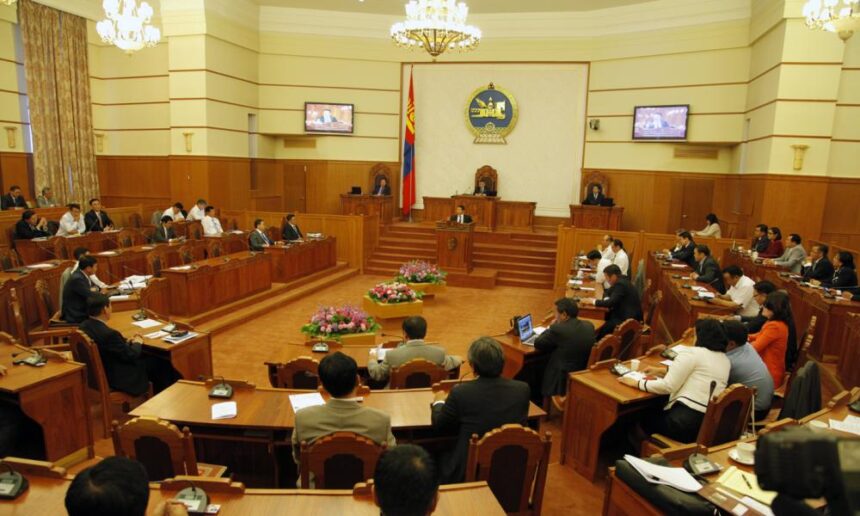The government had drafted and finally got approved by the Great Khural budget for 2012 recently. The Minister of Finance has informed that the government’s wallet has gotten thicker and it was going to increase its spending as the income from customs tax goes up due to increase in coal and copper exports and imports of mining equipments. A draft to increase the budget spending by an amount equal to 5 percent of GDP has been made ready. The International Monetary Fund has stated that there is no need for a budget amendment.
As economy of Mongolia expands too fast with a drastic increase in loans, purchasing power is falling because of increase of currency in circulation and excessive social care spending. The current state of public budget and money reminds us the year of 2008. At that time, price of copper fell by 300 percent and a ton of copper were priced at USD 3000 causing an interruption in the budgetary revenue, which forced Mongolia to get a loan of USD 250 million from IMF. The conditions of the loan were not to increase the budget spending in the next two years and not to have a budgetary loss more than 5 percent of GDP. After overcoming the crisis, the government planned that the budgetary loss would equal 9 percent of GDP. But, the spending is going to be increased again before 2012.
Economy is heating up
Value of currency is falling because the government is spending the money they made when prices of few minerals were high in international markets not in creating values but in reallocation and giving people money for free in order to fulfill election promises. If the government manages to have influence on improving infrastructure, increasing the number of hospitals and schools and enhance productivity of private sector, there will be actual economic growth. Also, if budget surplus is not spent on improving productivity and competitiveness, it should at least be spent on paying external debt. For example, if we starting paying pension fund debt, it will have a positive influence on stock market. The government of Mongolia is getting bigger and bigger that its small economy cannot handle.
Monetary policy has to be kept tightened
As the government is desperate to fulfill its political promises by handing out money for free, inflation is increasing. When inflation increases, the Central Bank of Mongolia has no choice but to tighten its monetary policy. Furthermore, the Central Bank of Mongolia has increased reserve requirements of transactional and savings accounts for retail banks and decreased the amount of cash on the market by raising interest rate of its bond. The central bank has raised its policy interest rate by 0.75 percent making it 11.75 percent.
The global market has started to deteriorate
The global economy is slipping into its next crisis. A crisis hit the world economy three years ago due to international banks that granted home loans to people who may have difficulty maintaining the repayment schedule and sold those loans to other organizations. Even though the crisis was overcome by tightening control over bank operations after many banks and financial organizations were bankrupt, the next crisis is already here. The main cause of this crisis is that the government spending of many countries has exceeded the economic capacities. Policies on social care and reallocation of capital of these countries have not been supporting economic productivity. The governments of countries in Southern Europe such as Greece, Portugal, Spain and Italy are in danger of bankruptcy due to their great debt. The US debt has also hit record high. Economies of the world’s superpowers have become stagnant and stopped exports from China and other suppliers. This might even have a drastic influence on countries that supply raw materials such as Mongolia.
Governance amendment is needed rather than budget amendment
The government of Mongolia now has a bad habit that when its income increases, they tend to raise the government spending under the name of “budget amendment” every season. Taxpayers have no way of knowing if the government spending is efficient or not because the government measures its budget investment not by the outputs or results but only by the inputs or income. Taxpayers now see that the government builds new palaces, holds big celebrations and fixes the same road every year. We have been informed that a district mayor embezzled MNT 300 million from the district’s budget that was supposed to be spent on removing snow and ice from roads. It is impossible to evaluate operations of a non-transparent government. Spending of MNT 1 billion of every one of 76 members of parliament has to be made clear to public. People need a governance amendment more than a budget one. It is time that the government saw the reality and necessities above, postponed the budget amendment, made the government operation transparent at every level and take measures against those whose actions were not responsible enough.
Translated B.AMAR







